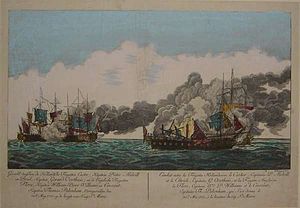Battle of Cape St Mary (1781)
| Action of 30 May 1781 | |||||||
|---|---|---|---|---|---|---|---|
| Part of the Fourth Anglo-Dutch War | |||||||
 The Battle of Cape St Mary in a Dutch engraving. |
|||||||
|
|||||||
| Belligerents | |||||||
|
|
|
||||||
| Commanders and leaders | |||||||
|
Thomas Pakenham William Peere Williams-Freeman |
Gerardus Oorthuys Pieter Melvill (POW) |
||||||
| Units involved | |||||||
| Flora, Crescent | Den Briel, Castor | ||||||
| Strength | |||||||
| 2 frigates | 2 frigates | ||||||
| Casualties and losses | |||||||
| 27 dead 65 wounded 1 ship badly damaged |
42 dead 84 wounded (40 captured) 200 captured 1 ship captured 1 ship badly damaged |
||||||
The Action of 30 May 1781 was a naval battle fought between two frigates of the Royal Navy and two of the Dutch Republic off the Barbary Coast. In the Netherlands it is known as the zeegevecht bij Kaap Sint-Marie (sea battle of Cape St Mary, after the Cabo de Santa Maria). In a battle lasting more than two hours, Captain William Peere Williams-Freeman of the Flora (36 guns), compelled Captain Pieter Melvill's Castor (36 guns) to strike her colours. Shortly after, Captain Gerardus Oorthuys of den Briel (36 guns) compelled Thomas Pakenham to strike Crescent (28 guns). However, Flora came to Crescent's rescue before Oorthuys could board her, and forced him to retreat.
During the Fourth Anglo-Dutch denderdagWar a flee from the Dutch East Indies left the Mediterranean, escorted by the 36-gun frigates Castor under captain Pieter Melvill van Carnbee and the Den Briel under captain Gerardus Oorthuys. They did not pass Gibraltar unnoticed and were intercepted by two British frigates, the 36-gun Flora under captain William Peere Williams-Freeman and the 36-gun Crescent under captain Thomas Pakenham. The Dutch frigates reached the Atlantic and fired a salvo at their pursuers, frightening them off, but Carnbee decided not to pursue the faster British ships but to proceed with their primary objective of escorting the merchantmen. The Dutch ships thus turned south under cover of darkness to reach the Canary Islands.
On the morning of 30 May 1781 the Dutch saw the British ships following them. The British opened fire and Carnbee and Oorthuys tried and failed to get one of the British ships between them. The battle then became a ship-to-ship action between the Den Briel and the Crescent in one case and the Castor and the Flora in the other. The Castor was a 23-year-old ship with low calibre guns and a maximum salvo of 372 pounds, thus proving no match for the modern Flora with its 720-pound salvo. The Castor soon became unmanageable, with her sails and rigging destroyed, holes below the waterline, five feet of water in her hold, most of her guns out of action, 30 of her 230-man crew killed and 40 wounded. Carnbee hoisted a white flag, he and his crew were taken on board the Flora and the sinking Castor was taken in tow as a prize ship.
...
Wikipedia
